Events at Swinburne to celebrate National Science Week 2025

Swinburne is proud to champion the outstanding contributions of our scientists this National Science Week
In summary
- National Science Week (9-17 August 2025) is Australia’s annual celebration of science and technology.
- The university is hosting a suite of free science events, with something for every science enthusiast.
National Science Week (9-17 August 2025) is Australia’s annual celebration of science and technology.
As a leading university for science, Swinburne is proud to champion the outstanding contributions of our scientists this National Science Week
The university is hosting a suite of free science events, with something for every science enthusiast.
Don’t miss your chance to learn from Swinburne’s renowned scientists and science communicators! Read our quick guide below to learn more about our events and register your attendance.
National Science Week is held annually to encourage an interest in science pursuits, through more than 1,000 events across Australia.
Decoding the Universe – Exploring the unknown with nature’s hidden language
When: Wednesday 13 August, 6.00pm – 7.30pm
Where: Swinburne’s Hawthorn campus
Attendance: In-person
Explore roaming activity stations featuring paper circuits, sun prints, DIY star wheels, UV experiments, and more — perfect for curious kids and the young at heart.
Then, settle in for an energising panel conversation that reveals the hidden languages of the cosmos. From AI-hunted cosmic flashes and gravitational wave chirps to radio maps of the Milky Way and the cultural star knowledge that has guided people for tens of thousands of years, our panellists will decode how we read the sky.
Quantum Horizons: From Brainwaves to Time Crystals
When: Friday 15 August, 6.00pm – 7.00pm (Refreshments served at 5.00pm)
Where: Swinburne’s Hawthorn campus
Attendance: In-person
2025 marks the International Year of Quantum Science and Technology—an opportunity to celebrate and explore one of the most transformative fields in modern science.
Discover why quantum is such a big deal at Swinburne’s quantum showcase, where five leading researchers will share their groundbreaking work. From unlocking the secrets of the brain to investigating the amazing realm of time crystals, learn how quantum physics is already reshaping neuroscience, computing, and our understanding of reality. The event will open with a special welcome from Swinburne’s Chief Scientist, Professor Virginia Kilborn.
Women in STEM as Sustainable Future Leaders
When: Monday 18 August
Attendance: Online
Shaping STEM Futures, led by Dr. Bita Zaferanloo, in collaboration with the Women in STEM Club, is proud to host this engaging online panel discussion. The event will feature five remarkable women whose work spans across artificial intelligence, science communication, Indigenous knowledge, sustainability, and neuroscience. Through their lived experiences and leadership journeys, they will explore how women in STEM are driving a more inclusive, innovative, and sustainable future. Whether you're a student, educator, or aspiring changemaker, this is a unique opportunity to connect, reflect, and be inspired by the next generation of STEM leaders.
Lecture: Programming a Quantum Computer
When: Tuesday 19 August
Where: Swinburne’s Hawthorn campus or online
Attendance: In-person or online
Join Associate Professor Chris Ferrie from University of Technology Sydney (UTS) for an engaging lecture on how quantum computers work—and how you can program one yourself. Aimed at curious secondary and tertiary students, this session features hands-on exploration. Don’t miss this chance to learn from one of Australia’s most dynamic science communicators—plus, there’s pizza!
Pub Quiz: National Quantum & Dark Matter Road Trip
When: Friday 22 August
Where: The Clyde Hotel, 385 Cardigan St, Carlton 3053, 7:00 - 9:00pm
Attendance: In-person
Don’t stress, the National Quantum & Dark Matter Road Trip pub trivia won’t bring back nightmares of science exams past! Expect regular pub trivia, but with a science-y vibe, including topics like sport, movies, music, geography, pop culture and general knowledge, and a bonus ‘tomorrow’s science headlines’ activity.
-
Media Enquiries
Related articles
-

- Science
- University
Swinburne looks to the STaRS for global research talent
Swinburne Talented Researcher Scheme (STaRS) is a strategic initiative designed to enhance Swinburne’s ability to attract and retain world-class research talent
Wednesday 30 July 2025 -

- Science
- University
Events at Swinburne to celebrate National Science Week 2025
As a leading university for science, Swinburne is proud to champion the outstanding contributions of our scientists to the global stage this National Science Week.
Wednesday 30 July 2025 -

- Health
Can oranges, garlic and echinacea really help avoid the cold and flu?
Swinburne Dietetics Lecturer Dr Nina Imad shares how to help avoid the cold and flu.
Thursday 10 July 2025 -

- Technology
- Science
- University
- Engineering
Swinburne to advance battery life and EV cybersecurity with Australian Research Council grants
Swinburne has secured two grants from Australian Research Councils to advance research in energy storage and cybersecurity.
Wednesday 02 July 2025 -

- Technology
- Science
- University
- Sustainability
Swinburne powers breakthroughs in sustainable mining and materials technology
Swinburne innovators have been awarded $4 million in funding from the Australian Government, driving Australia’s future in sustainable innovation through two groundbreaking projects.
Tuesday 15 July 2025

